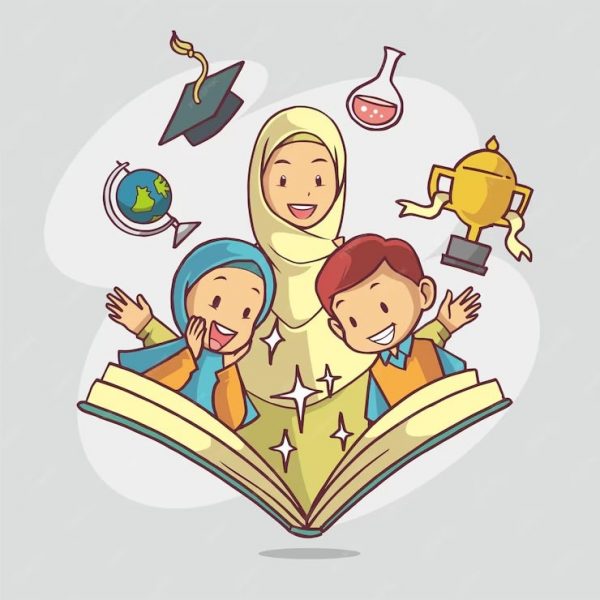Parents, teachers, and people who work with children nowadays often complain, especially those who directly care for children, even adolescents that are very difficult to control. Grumpy, stubborn, rude or otherwise behaviour can harm the child himself and others.
Consequently, religious and moral education is very important to help children live in society with good attitude. One of them is with good ethics, because ethics is the basis of the teachings of Islam after faith, science, and shariah, it is important for children to understand and apply ethics and morals as far as possible.
Then such as rehabilitation, family conditions at home, a good environment, and parental attention are components that help build a child’s morality. While the constraints are parents who don’t understand Islam, too free environments, and limited time with children.
Teenage violence, increased bullying, too free involvement in movies or harmful content such as pornography, criminal, drugs, and free societies are some of the consequences of not implanting religion in children.
Here are Some Consequences When Islamic Education has Not been Taught Since Childhood:
A. Promiscuity
There is promiscuity as we see and know, the ways and thinking of today’s generations are changing in these so sophisticated and evolving ages. Their mindset must be different from that of their parents. Their mindset must be different from that of their parents.
Where children can access a variety of information as well as the latest and up-to-date information through electronic devices. It is here that children are sometimes affected by unhealthy relationships, such as interacting with the opposite sex, drunkenness, or drug use as a result of unhealthier relationships.
B. Lost Direction
If children are taught religion late, or even not taught at all, they will not have a strong foundation for life. Religious science is a foundation that everyone should have. As early as possible they learn religion, the stronger the foundation will be.
C. Good Child Character is Difficult to Form
Studying religion is not just learning the right and right way of worship so that it is accepted religion also teaches how to behave well with other people, the environment, and other creatures. With strong religious knowledge, children will be able to distinguish between good and bad.
D. Unbelievers on God
A child who is not identified by religion is the same as not being identified with God. Children who do not know God or have no religious knowledge are important to understand that man is only a creature who has a responsibility to the Creator and his neighbour If they do not know God or do not have sufficient knowledge of religion, they tend to behave in a sense of self-righteousness.
E. Easy to Feel Empty
Children who lack religious knowledge often lose direction and become apathetic as they grow up. The problems of life will increase as you grow up. Worshiping God is one way
to ease the challenges that come with life. But a child who doesn’t know religion can’t do that. Do not do special worship, routine worshipping done five times a day is never carried out. It will return to negative things, especially if the people around it do the same negative things.
Solution
There are some impacts that may occur, there is a solution in overcoming or preventing them, by educating them through the teaching of religion that is Islamic education. Surely according to the guidance of the Prophet Muhammad SAW and follow the command of Allah in the Qur’an.
Through the teaching of Islamic education right and good then will lead the children on the right path. However, in conveying Islamic education it is necessary to be consistent and serious, taking into account the condition of the child and the existing situation.
There are some parents who choose to enroll their children in the Boarding School or we Called Pesantren to pursue their religious education, and when children are educated in the public school then it is obligatory for parents to find religious teachers who can give Islamic education well and correctly, of course the role of parents must be fulfilled with their duty as parents who teach Islamic religion well and properly through the teachings of the Shariah that God has established.
And when the Islamic education has been fulfilled, the other parents are obliged to watch the children in social relations and to be friends with their peers so that they are not met with the wrong neighbourhood and find a good circle friends.
Conclusion
From information and data that show that Islamic education to children from an early age is crucial to their moral and ethical development. Failure to in still religious teachings in a child can lead to various negative effects such as loss of direction, difficulty in forming a good character, loss of morality, lack of knowledge of God, and a sense of void.
On the other hand, teaching Islam to children from an early age can yield good results, such as guiding them on the right path, helping them to distinguish between right and wrong, and instilling a sense of responsibility for what they do.
In order to overcome and prevent the negative impact of not teaching Islamic education to children, it is important to educate them consistently and seriously through the teaching of the true Islam according to the guidance of Muhammad SAW and the command of Allah SWT in the Quran.
Parents play an important role in ensuring their children receive good Islamic education, either by enrolling them in Islamic schools or providing competent Islamic teachers if they attend public schools. Parents must fulfil their duty in teaching Islamic education effectively by adhering to the teachings of shariah law.
In conclusion, the importance of Islamic education for children cannot be overstated, because Islamic Education serves as a foundation for their moral and ethical development, guiding them on the right path and helping them navigate the challenges of life with faith and wisdom.
By advancing Islamic education for children, parents and educators can contribute to forming a generation of individuals who have strong moral values and a deep understanding of faith.
Author: Hasna Noor Alifa
Arabic Language Education Student, Prof. Dr Hamka Muhammadiyah University
Editor: Salwa Alifah Yusrina
Bahasa: Rahmat Al Kafi
References
Azkia rahmi, Ainun, Widea. 2023. “PENTINGNYA PENDIDIKAN ISLAM BAGI ANAK USIA DINI.” Islamic Education 1: 475–88.
Sholeh, Muhammad. 2018. “Pendidikan Anak Usia Dini Dalam Perspektif Pendidikan Islam.” YINYANG: Jurnal Studi Islam, Gender Dan Anak 13 (1): 71–83. https://doi.org/10.24090/yinyang.v13i1.2018.pp71-83.
Somad, Momod Abdul. 2021. “Pentingnya Pendidikan Agama Islam Dalam Membentuk Karakter Anak.” QALAMUNA: Jurnal Pendidikan, Sosial, Dan Agama 13 (2): 171–86. https://doi.org/10.37680/qalamuna.v13i2.882.
Ali, Mahdi M. 2015. “Pembelajaran Pendidikan Agama Islam Bagi Anak Usia Dini Mahdi.” Jrnal Edukasi 1 (2): 190–215. https://jurnal.ar-raniry.ac.id/index.php/cobaBK/article/view/605.
Kamila, Aiena. 2023. “Pentingnya Pendidikan Agama Islam Dan Pendidikan Moral Dalam Membina Karakter Anak Sekolah Dasar.” Al-Furqan : Jurnal Agama, Sosial, Dan Budaya 5 (5): 1–14. https://www.ncbi.nlm.nih.gov/books/NBK558907/.
Follow the latest news from Media Mahasiswa Indonesia at Google News















